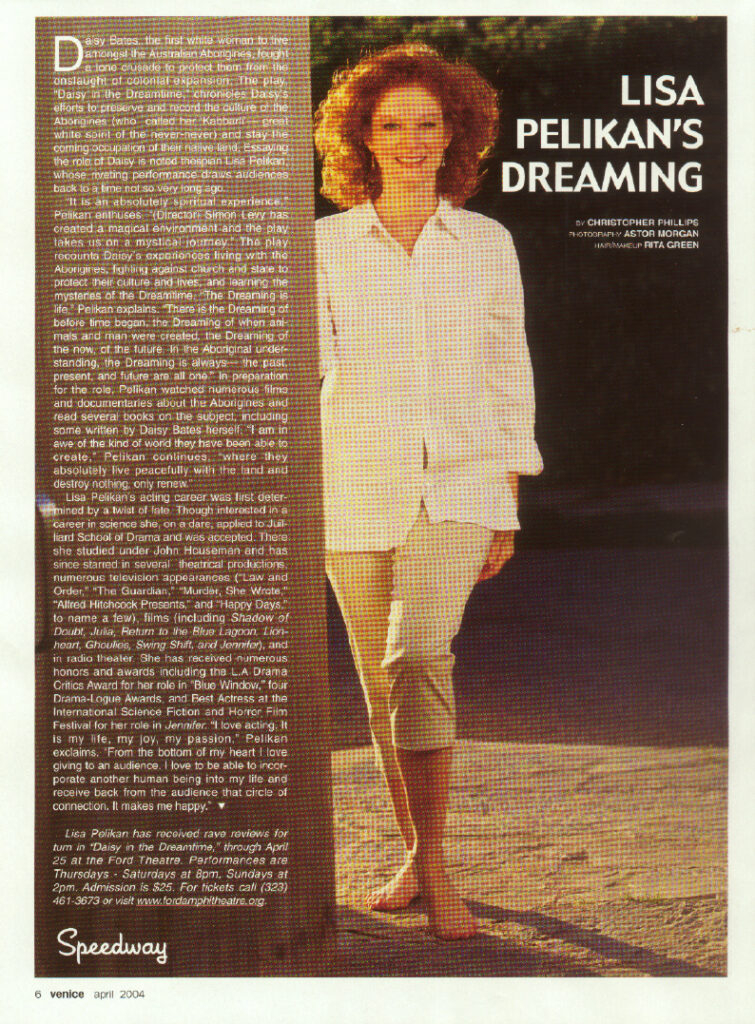BACK STAGE THE ACTOR’S RESOURCE
Fitzmaurice Integrates Vocal Production With Movement
By John Henny
June 27, 2011
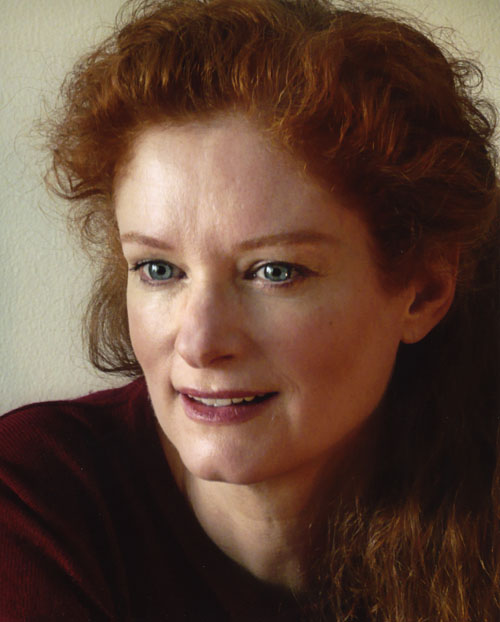
One of the great challenges that actors face is bringing together different disciplines into a single, masterful performance. Acting, movement, and vocal training often occur separately, leaving the actor feeling out of balance, with one skill dominating the others.
Fitzmaurice Voicework was developed to address this issue, to give actors a fully integrated approach to their vocal instrument and performance. Lisa Pelikan is an experienced stage and screen actor-director who is bringing this approach to students and working professionals in master classes and private sessions.
Take a Breather
Fitzmaurice Voicework was created by Catherine Fitzmaurice to solve the problems that actors face in being vocally expressive. “Catherine has a fabulous voice and couldn’t understand why everyone couldn’t do what she could do,” says Pelikan. “She went back to the very beginning to figure out how to help people find their voice.”
The search for vocal freedom led to very basic questions. “We go back to the question ‘Why do we even breathe?’ ” Pelikan says. She then looks at how the actor is breathing. “Are there any places in your body that are locked or held, so your body is not able to breathe in a free way before you even make a sound?”
Common Problems
Pelikan has found that one of the problems faced by many actors in trying to be heard on stage or even on film is that their voices have no “vibration” to them. “These vibrations are vital,” she says, “because if the sound is not vibrating off the bones and through the muscles, it’s not reaching us.” She has noticed that actors in Los Angeles in particular struggle on stage, as so much of the focus there is on film and TV. “Often actors in L.A. are caught in their throat,” she explains. “Their breath production actually gets stopped in their throat; they are not allowing it through and out.”
First Lesson
Pelikan allots two hours for a first lesson. The first hour consists of questions designed to really get to know the student. The second hour is when the real work begins. “I like to get them down on the floor and get my hands on their ribs and certain acupressure points that help release the lungs and the breath,” she says, “to give them a sensation of free breath and what they will be working towards.”
Pelikan will show the student where hidden tensions lie. “The most obvious place people will feel this tension is in the throat or neck,” she says. “However, for me, the primary place is in the ribs.” This tension can interfere with breathing. “Most actors don’t get a really full breath by allowing their ribs to fully move or to allow the inhale, or inspiration, to come into their body.” The problems can continue when exhaling, she adds. “They can tend to squeeze the ribs, so the sound produced is not a free sound but more of a forced sound.”
Pelikan’s teaching focuses on each student’s individual needs. “The vocal work that Catherine has developed is so individual to each person,” she says. “I do completely different exercises with each student. It’s not just about the ribs opening. It’s how they open; it’s how they move and flow. It’s more complex.”
Students must also be willing to give themselves over to the process. “It takes enormous curiosity to delve in and find those places where an actor can really let go,” Pelikan says. Ultimately, she seeks to create a place where actors “are more emotionally available to communicate in all the different heightened states of emotion that we as actors must give voice to.”
Break It Down, Build It Up
Fitzmaurice Voicework has two phases: destructuring and restructuring.
“Destructuring is about letting go, where the exercises help the autonomic nervous system take over,” Pelikan explains. “The mind gets out of the way, and the breath can just come in naturally, in a way that is a free breath.” This breath is called the “surprise breath.” “The surprise breath is the key,” she notes. “It is a breath that is not controlled, not held by habit or unconscious emotions or fear from the past.”
The next phase is restructuring, “which is about producing,” she says. “It’s about being the character on film or on stage.” This is where Pelikan will ask very focused questions. “Why are you producing sound? What are you trying to say? Where are the thoughts vibrating off the bone? Your whole body is a free instrument to produce not just sound but the whole character.”
Going Extreme
Many actors struggle in performance with extreme vocal sounds such as screaming or shouting. Pelikan insists that these sounds should never be an issue: “Once you know how to produce sound, it’s not something to even worry about. You’re going from the gut out through the mouth, and the throat is merely an open channel.”
Ultimately, all this work should result in a completely unfettered performer. “As actors, we strive to be present,” says Pelikan. “If the actor has continuous free breath and an open throat, and they know who the character is, what they want to say, and why they are saying it, the sounds they will produce will take care of themselves.”
Lisa Pelikan can be contacted at voice.pelikan@gmail.com and through her website, www.lisapelikan.com. She will conduct a voice workshop through the SAG Conservatory on July 31 in Los Angeles and a vocal intensive this August at L.A.’s New American Studio for Actors.
NEVER LAND – 2009
BACK STAGE THE ACTOR’S RESOURCE
From Cast to Cast
Accomplished actor Lisa Pelikan no longer needs a crutch.
By Jeff Favre
October 6, 2009
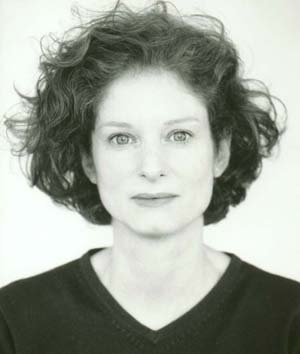
As a high school senior in the 1970s, Lisa Pelikan knew slightly more than nothing about acting when, still recovering from major leg surgery, she hobbled on crutches into the administration office of the Juilliard School of Drama, simply on a fact-finding visit to see the facilities, with no plans to enroll. An administrator gazed over her desk at the petite redhead and said coldly, “I don’t know what makes you think you could ever get into our school.” For some actors, a career is born from one simple action, and that rude dismissal was the spark that ignited a career of hit films, award-winning plays, and dozens of TV-show appearances.
The latest theater foray for Pelikan is with Rogue Machine’s U.S. premiere of writer-director Phyllis Nagy’s “Never Land” at Theatre/Theater in Los Angeles. First performed in 1998 at London’s Royal Court Theatre, “Never Land” is a three-act tragicomedy about a family of three living in the south of France whose patriarch, Henri, is an Anglophile who wants to work and live in England. His wife, Anne, is an alcoholic, and their 30-something daughter wants to marry an African-American casino employee. The play has been translated into 20 languages, but Nagy refused offers from American companies to produce it until she was persuaded by Rogue Machine artistic director John Perrin Flynn to bring the play here. And when Flynn suggested company members for Nagy to audition, the short list included Pelikan.
“I met Lisa when she became a presence out here in the 1970s at the same time I had taken a detour into television,” Flynn says. “Then we worked together when I was an executive director of ‘Strong Medicine’ and directed an episode she was on in 2003. When we started Rogue Machine, we started doing a lot of play readings, and Lisa started coming to all of them. She told me she liked what we were doing, and I was thrilled.”
Showing up for readings was hardly Pelikan’s covert plan to land a starring role in a Rogue Machine production. She simply was following her edict of remaining active between jobs. She meets with a group weekly for voice exercises she learned from vocal expert Patsy Rodenburg. “I think actors should be working on a scene or monologue every day,” Pelikan says. “I once audited an acting class, and the teacher asked how many students worked on their bodies at the gym every day. Everyone raised their hand. Then she asked who worked on their acting every day, and not one hand went up. And I thought, ‘Oh my God, there it is. That’s what’s wrong with the mentality of acting in Los Angeles.’ “
For Pelikan, preparing for a role borders on obsession. She received the “Never Land” script a week before meeting with Nagy. Flynn suggested her for the role of Englishwoman Heather, whose husband owns a chain of bookshops where Henri plans to work. Pelikan read the play with Heather in mind, but the actor took the time to connect with all the quirky characters before meeting with Nagy. “I find it to be true of other European directors [Nagy is American but lived for several years in England] that much more respect is given to the actors,” Pelikan explains. “First there is a meeting before a reading. I sat with her and talked about the play. And at one point she asked me which character I most responded to, and I heard the name Anne come out of my mouth. The thing is I had been told the part had been cast with a name actor and that it was not available. I wanted to be in this production no matter what part I played, and I thought by saying Anne that I had lost the chance. But, unknown to me, that name actor was unavailable, and Phyllis said yes.”
Nagy recalls being impressed by how well Pelikan was able to speak intelligently about all of the characters. “Lisa never once judged the character of Anne Joubert in our discussions about the part,” the director says. “That impressed me immensely. It is very easy to take the view that this family is in some profound way disturbed or unhappy. And Lisa resisted then, and has continued to resist now, the temptation to take the easy road with Anne. She is fearless in many ways, which makes working with her exciting.”
Cast in April, Pelikan has focused squarely on Anne and “Never Land” leading up to rehearsals. “The more time I have, the better I can do with a role,” she says. “I dream on her. I think on her. It’s all about the role settling into my bones.” While preparing for a part, Pelikan still recalls her process before Juilliard—before she had any formal training. All she knew was from the book “The Magic If,” which teaches the Stanislavsky method to children, urging them to think what they would do if they were a certain character.
Card-Carrying Actor
Born in Italy, Pelikan also lived in Japan and France as a child, the result of her father’s work as a financial attaché for the U.S. government and minister-counselor to the Organisation for Economic Co-operation and Development. While Pelikan was living in Maryland as a teenager, her mother connected her with a local theater company director, who allowed the teen to spend the summer before her senior year assistant-directing plays and appearing in the musicals as a dancer.
And then came the surgery. A tumor was discovered in the marrow of Pelikan’s left leg. It was removed successfully, but she was forced to lie in bed for months in a hip-to-toe cast that also meant the end of her dance career. With all that time to think, Pelikan decided directing would be ideal—as a hobby—along with rock climbing, to round out her life’s work in the field of either math or science. So she decided to look into colleges with acting programs that were located near mountains. She visited New York a few months later, while still in a cast, to get advice from the only acting professional her parents knew. He suggested she visit Juilliard to check out its facilities. And that’s when the rude administrator unwittingly took a potential scientist and turned her into an actor.
“When she kicked me out of her office, I was stunned,” Pelikan says. “I thought, ‘You don’t know me.’ She sent me with a kind assistant who was to show me around. I asked if I could have an application. I took it home and filled it out.” Where the application asked for acting experience, Pelikan—who had dance, one talent show, and a summer as an assistant director to her credits—listed all of the plays she had seen or read, well-aware it may be misconstrued as productions in which she had appeared. She was invited to audition. Up to that point, the only teacher she had was “The Magic If,” but her mentor at the Maryland theater company helped prepare two monologues, gave her last-minute coaching, and insisted she prepare index cards with information about the scenes to hand out at the audition.
“My cast had barely been off, and there I was in the same place I had been four months earlier,” Pelikan says. “I went down [off the stage] and started handing out my cards. They had never seen anything like it before.” Despite the awkward start—and having no idea until she started getting laughs that the monologues were comedic—she earned praise from John Houseman. A week later, she was in—and with a full scholarship. Without the scholarship, Pelikan says, most likely she would have enlisted in the Army to pay for school. Despite being the youngest student in her class and having way less experience than her classmates, she wound up with an agent before her freshman year was over. And in 1974, during her first summer break, she appeared in the Hallmark Hall of Fame TV movie “The Country Girl.” “It wasn’t until then that I realized I had no idea what I was doing, and that I wanted to know,” she says.
School taught her about vocal work, breaking down text, and other mechanics. But Pelikan says one of the best lessons she still uses when preparing for a role came not from Juilliard but from acting teacher Mira Rostova, who died in February at 99. Rostova taught Pelikan to be aware of her intention with every sentence she speaks onstage. “Whenever I am struggling, I think, ‘What am I “doing” with this sentence?’ ” says the actor.
Pelikan made her feature film debut in “Julia” in 1977. She soon followed that with the cult horror movie “Jennifer,” as well as a steady stream of appearances on the big and small screens. Her Los Angeles stage debut came in 1985 with “Blue Window,” which transferred from South Coast Repertory in Costa Mesa to Santa Monica’s Mayfair Theatre. She has in the last decade shifted more of her focus to theater. “It’s a difficult time in my career to get film and television work that is fulfilling,” she says. “But there is wonderful theater here. And I am in love with this play.”
“Never Land” is presented by Rogue Machine at Theatre/Theater, 5041 W. Pico Blvd., L.A. Oct. 8–15. Thu.–Sat., 8 p.m.; Sun., 2 p.m. (323) 960-7774.
Outtakes
– Is starring in the Web show “10,000 Days,” which Pelikan hopes will be online at the beginning of 2010
– Sees the acting process differently from her ex-husband Bruce Davison, noting: “We were in a play together at the Long Wharf Theatre, and when we left rehearsal I wanted to talk about the play and the characters, and he said, ‘We’re not in rehearsal. This is off time.’ “
– Loves playing comedic roles: “The first time I got a laugh, I was hooked.”

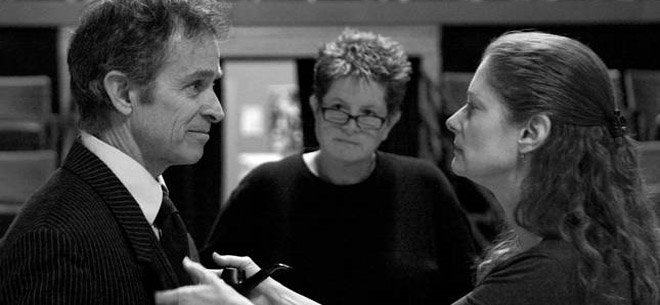
Phyllis Nagy Directs Her Never Land for Rogue Machine
by Lee Melville | October 8, 2009
Never Land, produced by John Flynn and Matthew Elkins for Rogue Machine, opens Oct. 8; plays Thurs.-Sat., 8 pm; Sun., 2 pm; through Nov. 15. Tickets: $25.Theatre Theater, 5041 Pico Blvd., Los Angeles; 323.960.7774 or roguemachinetheatre.com
Rogue Machine Artistic Director John Flynn hosted a free salon last month to introduce playwright/director Phyllis Nagy to the LA theatre community prior to the American premiere of her Never Land. The discussion centered on her tenure at London’s Royal Court Theatre and the panel included playwright Ron Hutchinson and British actress Katherine Tozer, both who were also in residence at RCT. Playwright/critic Steven Leigh Morris moderated. Nagy, who has dual citizenship and is a native New Yorker, came to LA five years ago to direct her first feature, HBO’s Mrs. Harris starring Annette Bening and Ben Kingsley. The film received several Emmy and Golden Globe nominations including ones for Nagy’s writing and direction.
Nagy, who occasionally tugged at her short-cropped hair, was forthright and amusing during the salon as she is for this interview. She discusses her association with The Royal Court Theatre as well as the Royal National Theatre and the Royal Shakespeare Company, all of which have commissioned her to write new plays.
She says, “I was writer-in-residence at the Royal Court Theatre during Stephen Daldry’s tenure as Artistic Director in the mid-to-late ’90s. Four of my plays have premiered at the Court, of which Never Land is one. I do have outstanding commissions from all three of these theatres and I intend to get around to fulfilling them… someday. Unfortunately, film work has interrupted that process; I hope to get back to the ever more satisfying task of writing plays within a year.”
She returned to the US, and specifically to Los Angeles, to make Mrs. Harris, which she describes as “a wonderful experience. Always rather an itinerant soul, here I stay, working on various film and television projects in development. For the moment!”
Her association with Rogue Machine came about early this year when Flynn and RM producer Matthew Elkins approached her British agent about the American rights to Never Land. Nagy says, “We all met shortly thereafter and I was impressed by their genuine passion about challenging theatre. I had been hesitant about licensing an American production of the play and have said no to various production requests. I often follow my hunches and I had a hunch this was the right situation in which to do the play with this new, intrepid theatre company.”
What inspired her to write Never Land? “While rehearsing my first play in the UK in 1992,” she says, “I came across a tiny wire story in a British tabloid newspaper about a French family who desperately wished to become English. To that end, they took some astonishing imaginative steps–not all of them entirely healthy–to achieve their goal. I can’t say much more about it without giving away things that are probably best discovered in a viewing of the piece but my own status as a person recently displaced (I had moved from New York to London in early 1992) into a culture I had expected would not be as entirely removed from my native culture as it actually was, fueled my interest in this tiny wire story. It took me six years to finally complete the play.”
How is the rehearsal process different here than in England? She pauses before making the comparison. “In practical terms, if it is a professional show in the UK, actors are paid a weekly salary, however small or large, even in the smallest of fringe theatres in London. So there is a regular rehearsal schedule that everyone adheres to over the course of approximately four to six weeks and there is no time off for any reason, apart from the most extraordinary personal circumstances or illness. I won’t get started on aesthetic differences until the rehearsal process is completed… Though I will say there would appear to be real differences in the ways in which actors need to arrive at where the play requires them to be, some of them thrilling and some of them not.”
What other differences is she finding in LA?
“I’ve now been here for five years so I’m not sure I feel the differences as fully any longer,” she says. “But certainly what at first appears to be the lack of weather was something I struggled with. I now can chart the subtle turns in the seasons here and do appreciate them very much. Other differences, philosophical and cultural, I don’t feel able to discuss without a couple of bottles of good California Zinfandel and several hours….! That’s another difference that has been a delightful surprise–the depth and variety of California reds as opposed to European reds. I am now a convert to California wines.” What else? “Baseball, a lifelong passion of mine. I no longer have to stay up until 1 am to watch baseball games broadcast live in the UK. Instead, I am a Dodgers season ticket holder which feels a bit like heresy as I am a Yankees fan but we make do with what we have at hand. Also, I did miss a good slice of old fashioned NY style pizza in the UK.”
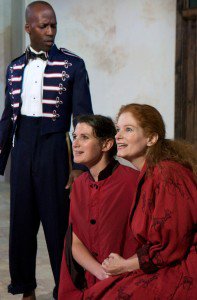
Who is in the cast of Never Land? Nagy smiles with pride at her selections. “Katherine Tozer is an actress I’ve worked with on several occasions. She is a trusted and valued collaborator as well as being a wonderful friend. I would not have done this production without her. Lisa Pelikan and Bradley Fisher are company members at Rogue Machine and I was delighted to find them fairly early on in the interview process. Will Stephens, Shannon Holt, Bill Hunt and Chris Shaw are not Rogue Machine members but come to us through various connections. They are a brave and imaginative company which I value very much. They were all invited to join the production because of qualities I felt they all possessed–a certain fearlessness, a certain understanding of the humor in the play, and all those things directors always talk about; in addition, I felt they’d make a good fit with each other, both as actors and as people.”
Photo: William Christopher Stevens (as Michael Carver), Katherine Tozer (as Elisabeth Joubert), and Lisa Pelikan (as Anne Joubert
So far, Nagy has written 13 plays, including translations or versions of plays such as her literal translation of The Seagull. She adds, “And one unproduced, fledgling effort which shall remain unproduced.” How does she select her topics? “I tend to think the plays choose me, not the other way around, in that an image will occur to me, or a series of images–often inspired by something I’ve seen or read in real life–and these images will evolve over a period of time into a play that has a shape and a narrative. It can sometimes take the writing of a play for a writer to understand fully why he or she is drawn to material or image and this is why I think many mature writers find they are constantly exploring the same ground, pondering the same questions, in each new piece of work.
“But what I never do is sit down to write by saying something like, ‘I want to write a play about love’–or war, or the banking crisis, or any other ‘issue’ because that is death, in my opinion, to art. When I’m done with a play, I may discover it’s really my response to, say, a political situation but to know that in advance leads to some pretty static and boring writing, I think.”
How does she approach adapting a play from a novel, such as Patricia Highsmith’s The Talented Mr. Ripley, compared to an original work? “It is always original work,” she says. “The only thing that’s different–and a bit of a gift–is that plot, the least interesting dramatic element, is handed to the writer on a plate. How freeing that can be. I see my job as adapter as one of honoring the source material’s tone–crucial, and often mangled in dramatic adaptations–its image structure and its metaphorical concerns.”
Besides the film and television scripts Nagy is developing, including an adaptation of Highsmith’s Carol, she would love to direct more plays or, she says, “Even get to the point where I could open a theatre that was modeled entirely on one like the Royal Court. That will require a great deal of money and time and a shift in how commitments to stage plays in LA are viewed by actors and other artistic personnel. Again, a very long discussion best had over a good meal accompanied by copious amounts of booze.”
LISA PELIKAN ENTERS NAGY’S NEVER LAND
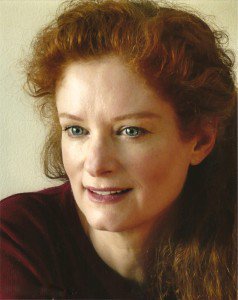
Actress Lisa Pelikan, whose flowing red hair is tousled about her head, has an extensive list of credits in film and television as well as New York and local theatre (visit her website at lisapelikan.com). I first saw her in a brilliant production of Craig Lucas’ Blue Window at South Coast Repertory in 1985, her initial West Coast stage outing. Filmgoers will remember her sharing the title role in Fred Zinnemann’s Julia (1977) with Vanessa Redgrave and Shadow of Doubt (1998) with Melanie Griffith.
How did she become involved with the fledgling Rogue Machine? “John Flynn and I have known each other since 2003 when he directed me in an episode of Strong Medicine, a TV show he also produced (for Lifetime),” Pelikan explains. “At the same time I was directing a production of ‘night, Mother with Interact Theatre and he came to see it. So, we began our mutual respect for each other. Our professional lives continued to cross paths when we were both working at the Odyssey Theatre and I recommended he direct Suzan-Lori Parks 365 Days 365 Plays when I couldn’t. I sit on the Odyssey’s Board of Directors so I am very involved there.
“In 2008 I came to see Rogue Machine’s inaugural production of Compleat Female Stage Beauty and I was just blown away by it. The direction, the concept, the set, the costumes, the actors…everything! And, there was John again. The Rogue was holding readings of plays being considered in the future and I just started showing up. John and I began a series of conversations where he explained his concept: to only present plays never seen in LA before. I wanted to support his vision because I felt it was vital to the LA theatrical scene. It’s the same way I felt when I saw Stephen Sachs’ production of After the Fall at the Fountain Theatre. I knew I wanted to be around people who were making great art.”
She was cast in Never Land as a result of Flynn telling her about a play he thought might have a role for her. “I read it,” she says, “and I loved it! It’s beautifully written. Very different. Very special. John set up a meeting with Phyllis last March. We talked and fell in love, so to speak, and then she asked me to come back and read. I was cast in April.”
How does she describe Never Land? Pelikan says, “The play, to me, is a love story; a love poem and I am part of that love poem. Anne Joubert is a French woman who has fallen in love with a very specific man for a very specific reason. She will follow him anywhere. As she says in the play, he is ‘the only man who will hoist the burden of me upon his shoulders and run with me all the way to the end. And that is worth my fidelity, my complicity in each of his endeavors.’ He is worth everything to her. Of course they are not all lovey-dovey. There is a George and Martha aspect to their relationship.”
Pelikan welcomes playing complicated roles. For Joubert she says, “In approaching a part like this, it’s really about allowing the character to settle down into my bones. I have been very fortunate to have had her with me since April. I have had time with her, to live and breathe with her, to dream on her. This is how I have taken her into me.”
Has she worked before with playwrights who also direct? “The only other time I have worked with a director who was also the playwright was in a staged reading of Simon Levy’s adaptation of The Great Gatsby,” Pelikan recalls. “So, this is really the first time I have had an experience of a full production with a playwright/director. The play is a beautiful piece of writing. I think Phyllis Nagy is a poet and a musician. She directs unlike any other I’ve worked with before, really more like a conductor. She’s very aural and hears everything. In rehearsal, Phyllis says things like, ‘This is an opera!’ and ‘This monologue is the soprano’s aria.’ Also, ‘This scene is the chamber piece.’
“As a director Phyllis is very specific, very clear, about her vision and what she wants. It will be a very stylistic piece. Not unlike Des McAnuff who I worked with on Twelfth Night at La Jolla Playhouse. He, too, was a very exacting director; about every word, every movement… and that production was included in Time magazine’s 10 best productions of the year. Hopefully, this one will turn out as well,” she laughs. “This production truly is Phyllis’ vision as she is the playwright and the director.”
Since Pelikan has been doing theatre in LA for nearly 25 years, what can she suggest that could make it more vital, similar to New York and London? “It seems simple,” she says after a thoughtful pause. “We need to pay actors a living wage. If actors are given a way to live by working their craft, then they will have a deeper commitment to the work.

“I truly believe stage acting is a craft that can only be improved by doing it. If actors can be working with other actors and artists who are also making their living in the theater then the entire level of theater in Los Angeles will be raised much higher. Audiences will come flocking as they do now in New York or London. Right now it is hard for audience members to know where to direct their time, their energy and their money. If audiences know they can show up to any play in LA and be assured of a great experience then theater will be taken more seriously and the Times will start devoting more space for theater news and articles which will raise our visibility.
“In Rehearsal – Pelikan & Fisher”
“I highly commend Barbara Beckley of the Colony Theatre in Burbank, where I have been fortunate enough to work on several occasions. She works her butt off to make sure actors get paid for rehearsals and performances. It’s not a lot, a couple hundred dollars a week, but it makes a big difference. And, because of the contract she uses with Equity we also get health insurance. If more theatres here could even do that much, I think it would really help this town. I have always hoped each film/TV studio in this town would adopt one theater and pay for the running of it, including decent salaries for the artists.
“There is great theater happening here. I hope we, as members of our community, will be able to find a way to better respect and acknowledge our theater artists. It’s amazing what Rogue Machine has been able to accomplish in a little over a year. Its goal is to build a theatre of ideas and nurture the development of plays from contemporary writers that also reflect current culture and consciousness. I think John Flynn and Rogue Machine are achieving its goal. I hope the community will support them.”
Feature image of Phyllis Nagy and actors and story images by arsonistphotography.com.
On Friday, Sept. 4, 2009, Lisa was interviewed for her theater play, NEVER LAND, on KPFK radio (90.7 FM). The playwright/director, Phyllis Nagy, the producer, John Flynn, and actors Brad Fisher and Kathy Tozer were also interviewed. The show, Pacifica Performance Showcase, was moderated by Donna Walker.
BACKSTAGE WEST – 2008
“The Craft Cops (and Other Characters) With Props”
When it comes to props, actor Lisa Pelikan found early on that she had to take matters into her own hands. On the first day of her first TV movie, I Want to Keep My Baby, she had a scene inside a very small trailer that involved eating chitlins (pig intestines to you Northerners). The trailer stunk to high heaven. Forget sense memory; Pelikan knew she’d never be able to gobble the grub without vomiting, let alone with realistic gusto. Thinking quickly, she learned the chitlins came from the prop department and appealed to them for a more palatable substitute. “There’s nothing that looks like chitlins” was the reply. So Pelikan went to craft services, got some apples, and asked the prop people to chop them up and cook them. Problem solved.
BACKSTAGE WEST – 2006
“Actors We Love”
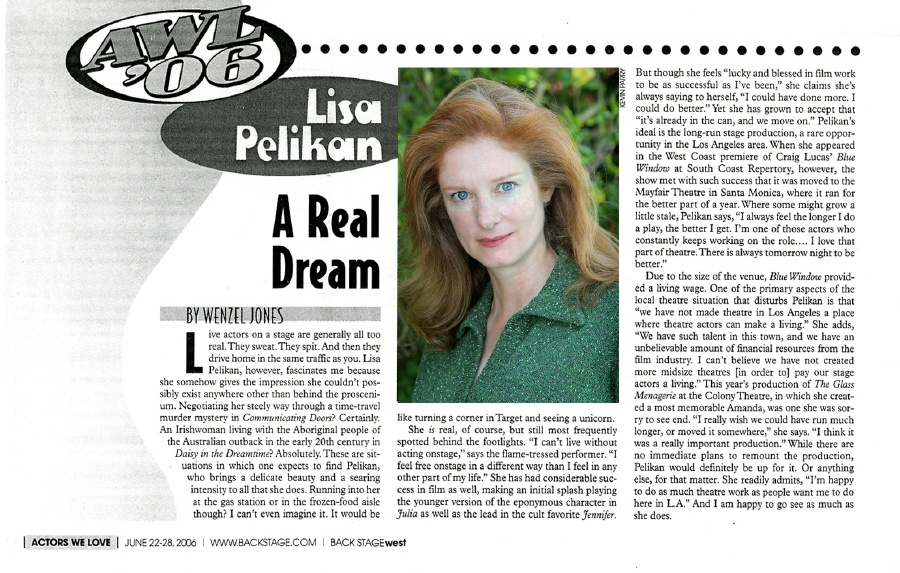
RETROCRUSH ONLINE – 2006
Lisa Pelikan
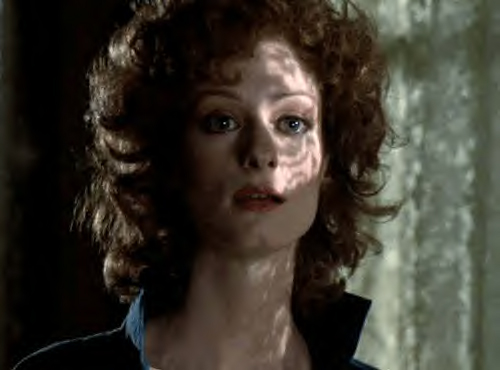
THE RETROCRUSH INTERVIEW
The talented Lisa Pelikan has appeared in a variety of different stage, film, and TV roles. Her first feature film, Julia, was nominated for 11 Oscars. She’s also co-starred with Jean-Claude Van Damme in Lionheart, battled Ghoulies, and made snakes kill people in the cult classic Jennifer. We caught up with Lisa and she had a lot of great stories to tell.
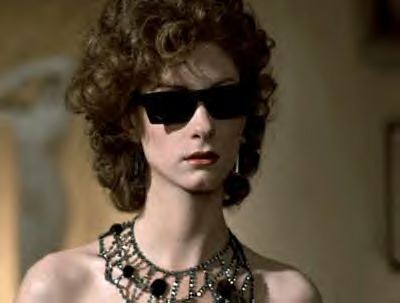
While growing up you lived in Italy and Japan.
As a child I always knew that Rome was my home. In all the places I traveled with my family as I grew up, I still kept waiting to go back “home.” I dearly miss Italy. I have extremely fond memories of living there.
Do you speak Italian?
I did, but I left when I was 7. I know the Italian of a 7 year old. I know nursery rhymes in Italian. Then we went to Japan and I went to a bilingual school there. I had to speak, write, and read Japanese and English. Then I came to the United States for my high school years.
It must be fascinating to speak and write Japanese.
I can no longer. I came to the United States and there wasn’t anyone to converse with. I started taking French in High School. I’m probably the most fluent in French because that’s the language I learned most recently. I have a very good ear for languages and for dialects, which is one of the reasons I’ve been able to do so many different dialects in acting. I learned how to be a Chameleon very early.
What inspired you to become an actress? You were an athlete?
I was a dancer. What made you think I was an athlete? I was a rock climber. I was wondering where you got “athlete” from? I was on the swim team. I’ve never thought of myself as an “athlete.” Mainly, the things I love to do are rock climbing and dancing which are very independent physical activities as opposed to competitions. I’ve always had a good, strong body.
You had an injury.
I had a bone tumor in the marrow of my left Tibia. For people who don’t know what the Tibia is, it’s the shinbone. It was major surgery. It basically put me in bed for my entire senior year of high school. It was tough and it put an end to my professional dancing career.
Is that what caused you to pursue a career in acting?
I had never been interested in acting before. Basically, I was going to audition for the Juilliard School of Dance. Once I had the surgery and was laid up I could not do that. Someone dared me to audition for Juilliard’s acting program. I had never acted before. I had never been in a high school play before. After my audition I was accepted to The Juilliard School of Drama with a full artistic scholarship.
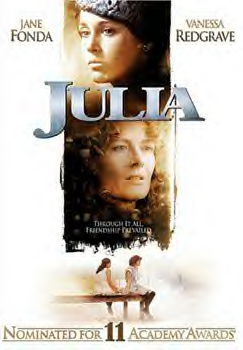
That’s something to be proud of.
It was a complete shock to my parents and everyone. It was not something I had been planning or gearing for, or something I wanted to do for the rest of my life. When I auditioned I thought for sure there was no way I was ever going to get in. I was just following through on this dare. It’s a four-year school. When you graduate you get a BFA. I left before I graduated because I started working so much.
One of your first big roles was in the movie Julia.
That was my feature film debut. Fred Zinnemann is just a brilliant director and a wonderful man. He’s deceased now. He taught me a lot about directing and he use to call me his “little assistant director.” He took me everywhere with him on the set.
Everyday they were filming he put this one scene, “Scene 249: Running through the Woods” on the call sheet. I was called everyday and I’d be there with him. He had me by his side. We’d walk around together and he’d ask me, “I’m going to do this shot this way, and what do you think of it?” We’d actually discuss it.
What a wonderful person.
It’s a long story how it all came about, but he generally was known to be a very removed person. He and I just hit it off. We didn’t shoot “Scene 249: Running through the Woods” till the very last day of filming.
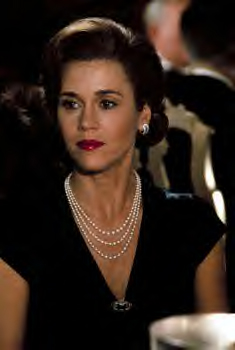
What about Jane Fonda or Vanessa Redgrave?
Jane Fonda was very sweet. I don’t want to say motherly, but more big sisterly to me and the little girl Susan who played Young Lilly. She took an interest in us, she spent time talking to us. She was friendly and warm.
Vanessa at the time was very involved in politics. We shared the same driver and he told me that after shooting he would take her to these places where she was up all night. She was giving speeches at rallies and then he’d pick her up the next morning at the same place. She was more unavailable personally, but I learned a lot from watching her work. Zinnemann made me watch her work in scenes. I watched them from rehearsal to filming. I learned a lot about film acting from watching Vanessa work. (And, of course I was also watching her very closely so I could incorporate “her” Julia into “my” Julia as we were playing the same character.)
I was amazed at how many Oscars the movie won.
It was up for best picture. I think it received best supporting actress & actor for Vanessa Redgrave & Jason Robards. I think it received best director. I’m not sure. It was nominated for everything. It won for best screenplay, too. It was quite an experience and I treasure that.
You did a well-remembered TV movie called The Best Little Girl in the World about Anorexia.
It was suppose to star Jodie Foster. She’d gone off to college and we were to film it over her winter break. She’d gained a lot of weight. They couldn’t hire her so they did this mad search and they found this unknown, Jennifer Jason Leigh.
There’s another TV movie you did with Mariel Hemingway called I Want to Keep My Baby.
That actually is the first film I ever did. It was a TV film, but I shot it right before I flew off to London to film Julia. It was the first film I had ever been cast in. I have to clarify that. I had done other television, but it was taped television.
The Hallmark Hall of Fame productions we rehearsed as a play and then shot on tape. I want to Keep My Baby was my first piece of film and Julia was my second piece of film, but my first feature film.
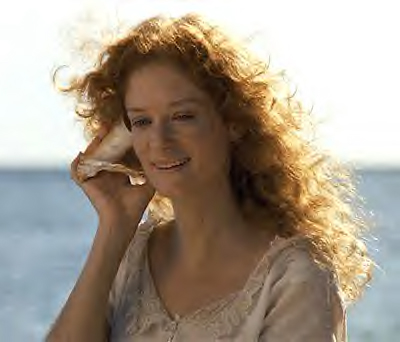
I did a PBS film called The Blue Hotel a bazillion years ago. On the IMDB website under my name in “Titles for Sale” they have PBS’s “The Blue Hotel,” but then they also have me listed with a porn film called “Blue Hotel – Caught in the Act” with a photo of a naked blond woman on the cover.
That is crazy.
The Internet doesn’t necessarily distinguish. I sent IMDB a note telling them I had never done a porn film. I certainly don’t want fans buying that film and going, “Where’s Lisa?”
The Blue Hotel had some heavy hitters in it.
It had David Warner, James Keach. Ján Kadár directed it. He got an academy award for doing The Shop on Main Street. He hired me for that movie while I was still at Juilliard. The first thing I ever did was The Country Girl, which was the Hallmark Hall of Fame production with Jason Robards, Shirley Knight, and George Grizzard during the summer between my first & second years of Juilliard.
You had some great roles early on.
I was very lucky. In my second year at Juilliard I met Ján Kadár and he said, “I’ve always wanted to make a film of I Never Promised You a Rose Garden and you are my girl. Let’s do The Blue Hotel together because I want to have you around and get to know you. Then we’ll get the rights back for I Never Promised You a Rose Garden and make it together.” I said, “Fine, but you have to get me out of school. If you can get me out of school I’ll be happy to work with you.” (Knowing full well the school would say, “Absolutely not!!!”)
I was in school one day and John Houseman called me into his office. He said, “Lisa, I want you to do this film with Ján Kadár. The entire faculty is completely against my decision, but you need to be working. I want you to go and work.”
When I came back to school after filming the faculty was horrific to me. There was a lot of anger & jealousy towards me.
Because they thought you had special treatment?
I did have special treatment and I’d just been on TV with The Country Girl.Then I was let off to do this other film. They were angry. Jan Kadar never was able to get the rights back for “I Never Promised You a Rose Garden.” He was severely disappointed and persisted for years.
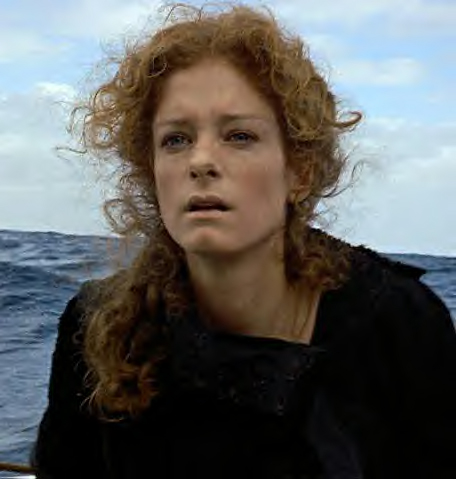
Is there jealously among professors?
I can say that there were teachers like John Housemen who were my champion. Then there were other people who were just horrid.
Is it amazing to see yourself on TV or the big screen?
I hated seeing myself. I always thought I looked awful, ugly, and too much. I hated it.
We’re our own worst critics.
I remember the first time I saw myself in The Country Girl. I was invited to a screening. Even though it was a movie for TV I saw it on a big screen. I just sat there in horror & tears. I thought “Oh my god. I guess I’m not going to be a film actress”. It was hard. What I remember was that I was talking way too fast and overacting. I haven’t seen it since then, which was many years ago.
Tell us about the horror movie Jennifer.
Jennifer was my second film. After Julia I did some stage work in New York. When I came back out to LA I did Jennifer.
It has quite a cult following.
It’s so interesting. I still get a lot of fan mail from Jennifer from all over the world. I guess it was a big hit not just in the United States, but also in a lot of other countries. Spain was big, Germany was big. It’s just fascinating what sticks in people’s minds.
Was it filmed in LA?
It was filmed in LA. It was very low budget. It was quite a shock after Julia where I had handmade period underwear that I was wearing. Not that anyone would ever have seen it or known about it. Not all productions have been that classy.
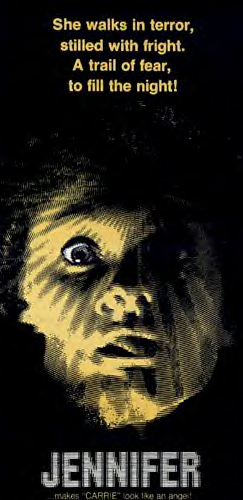
It’s like going from feast to famine.
I had a great time making Jennifer. It was a lot of fun until I had to do a lot of scenes in water with a towel wrapped around me with wet hair. They decided to do them all within a couple of days for location purposes. When they did it nobody thought about the fact that I might need dry towels or I might need to keep warm, or dry, between takes.
That would be a good thing to think about.
This being my second film, I did not realize I’d have to ask questions to make sure something like that was taken care of. I was stuck down in Manhattan Beach or somewhere. I had nothing. I had wet towels. I didn’t have dry towels. I was shivering. I was sitting there in my dressing room freezing cold. I got really sick. I got Bronchitis and near Pneumonia.
It was the role that nearly killed you.
I had a 104-degree temperature. I could hardly talk. The producer was flipping out. For tax reasons he had to finish filming by the end of the year.
He wasn’t concerned about your health as much as the financial part of the movie.
He was not concerned at all. He did something really awful. I can say this because…
He’s now passed on?
I don’t know if he’s passed on. His kids are still in the business. After this incident I still tried to make friends with him. I knew we were both in the business and would run into each other over the years. But, he was still so horrible to me afterwards I have no need to protect him.
When I got sick from filming those days in the water with no heat, the producer took me to his doctor who told me he just had to give me this B12 shot and I’d be fine. The doctor gave me a shot of speed but I did not know this till the next day when I crashed.
I went back to the set to film that same day of seeing this doctor and I was like FINE! I was filming everything with great energy and it was all great. Then, the next day I could not move. I was so sick. The Producer was even more awful. He was screaming at me on the phone and saying he was going to sue me. I ended up finishing the film for him by the end of the year, but with the guarantee he would let me loop my lines because I couldn’t talk. If you look at the film closely you can hear the places where I am really sick and can hardly speak. The producer never let me loop those lines.
Are you serious?
In addition, there’s a scene where my cat has died. I still had a voice for that. It was shot before I got sick. I was sobbing & sobbing my heart out. Apparently the sound for the scene didn’t record. Instead of asking me to come in and loop my own crying, the producer had someone else come in and sob for me. It’s such fake crying. You see me on the screen sobbing and then you hear this fake voice. I have never forgiven him for that.
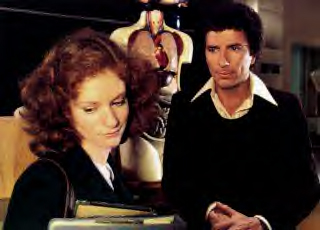
The movie did relatively well.
I was just so disappointed. At that time, I had hoped that people had higher artistic desires & goals. The producer was only interested in getting this film done and making money on it. I was supposed to receive a percentage of the profits. To this day the film’s still out there and they still say they never made a dime on it. I never received anything financially for it.
What about Celebrity Tattle-Tales host Bert Convy?
He was fun. He was sweet. Here we are making this low budget movie and he shows up with his own Maxi trailer. One of those huge trailers he carted around with him. All of the rest of us sat around in tiny little dressing rooms.
He knew how to take care of himself. He was a complete pro. Most of the scenes I had with him I was so sick I wasn’t functioning. The same with Nina Foch, too. I’d show up, do my scene, and then just lay back down in the trailer. I was really sick.
Did they use real snakes in that movie?
Whenever I’m acting I go into a different world that has nothing to do with Lisa. After I had been cast they invited me to the office to talk and meet everybody. I went in and they had a little tiny garter snake. They handed it to me and I started shrieking. I thought, “Oh my God, what am I going to do when they have real snakes?”
During filming I had the real snakes crawling through my hair and everything. It was so easy. I just get into another world and it wasn’t any problem. I believed them when they said there was nothing that could harm me or that was poisonous.
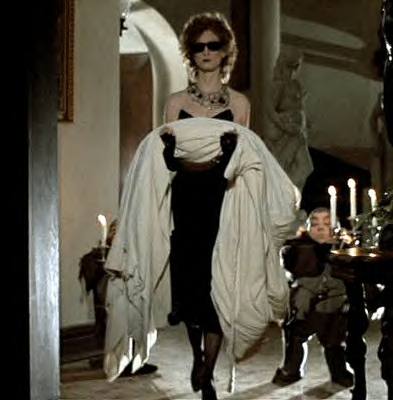
Did they use any special effects?
As far as the effects in Jennifer there was actually a huge monster snake. I don’t remember how many pounds. It was as long as I don’t even know. I don’t want to say a hundred feet. Its girth was at least 4 feet. They have it wrapped around a car in the movie. When you see Jennifer it looks like a toy car with a toy snake. They did not shoot it well. In reality it was this enormous snake we all had to clear out for. It definitely was capable of killing people, along with animals.
When you read it you must have seen the artistic merit to it?
The only reason why I did it was because my agent told me that now that I had done a film like Julia I needed to do a film that would reach different audiences.
What about Ghoulies?
It was another fun one. Mariska Hargitay who’s in Law & Order SVU has a small part in that. She’s Jane Mansfield’s daughter. She’s a big star right now. It was just a lark to make.
Was Luca a good director?
I don’t know about a good director. He was fun to work with. The whole process was sort of a lark.
What about the Ghoulies puppets?
To me they look so silly, but I don’t know
I remember being surprised because they made everyone come back to life at the end.
There’s one scene in there were I’m dead on the stairs. The lead, Peter Liapis, has to walk down the stairs and find me. In the shot he literally stepped on my hand and I had to stay dead. I did.
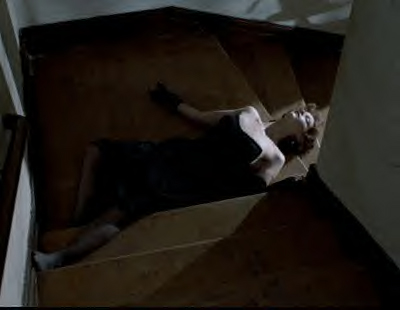
You did the movie Perfect Gentlemen.
It was a CBS movie. It was me, Sandy Dennis, Lauren Bacall, and Ruth Gordon had more of a cameo role. Jackie Cooper directed it and Nora Ephron wrote the screenplay. This was the most fun I ever had making a movie.
I think Ruth Gordon would have been the coolest person to meet.
All I’m going to say about that is NO COMMENT.
She looked like so much fun with Harold and Maude, and Every Which Way but Loose.
I’m serious. I’m serious. As a person. No comment.
She was a little tough to get along with?
I didn’t have much to do with her. She caused a lot of problems for the set and the producer. Lauren Bacall was unbelievably gracious & loving. Sandy Dennis took me into her arms. They were dreams to work with. All my stuff was with them.
You were also with Lee Remick and Patty Duke in “The Women’s Room”.
I was a lesbian. I leave my husband for Tovah Feldshuh. I remember being a drunk, too. It was nice because I was working with a lot of people I had worked with before. Colleen Dewhurst – I had worked with in Last Convertible, and also Mare Winningham.
You were in the movie Swing Shift?
I loved Jonathan Demme.
I read Goldie Hawn had the final cut and ended up ruining the movie.
I only know what I’ve heard. I know that Jonathan Demme did not like the final cut. He had a different film in mind and was forced to go back and re-shoot scenes differently than he had wanted.
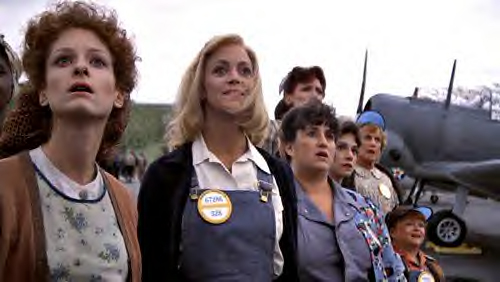
The movie ended up not doing so well.
It’s too bad. Originally it was an ensemble movie about women in the 1940’s. What came out was more like a Goldie Hawn starring vehicle. She and Christine Lahti were really good in it. Everyone was good. It’s just that the story of the film changed.
I think that if it had been more of a film about the 1940’s, as originally intended, it had the potential of being an Oscar winner.
Have you ever seen the director’s cut of the movie?
Jonathan sent it to me and I’ve been scared to look at it. I have it, but I don’t want to cry.
Some of your scenes got cut?
I know in the film that was made a lot of my scenes got cut. It became a much smaller role than I had filmed. But, it was a wonderful film to work on. Jonathan is a great director. All the women including Goldie Hawn, Christine Lahti, and Holly Hunter were just the best. It took a whole spring to film. I had a great time. Every day coming to work was like being with a wonderful family.
It was a good period piece.
I loved it. They did such great detail work. Some of the scenes that were re-shot are not as accurate in their period detail.
When I watched the film it says “directed by Jonathan Demme”.
Yes, I heard that it was supposed to say, “A Jonathan Demme Film” above the title and that he had asked for that to be removed. If that is really true, it’s a shame. Jonathan is a true artist.
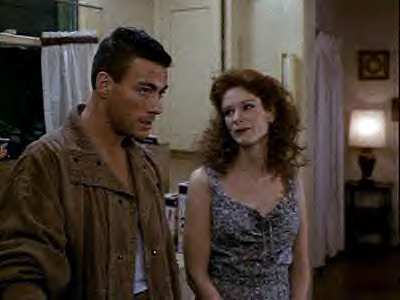
Lionheart must have been a fun movie?
It was a very difficult film. I was called on days when I wasn’t supposed to be filming. They’d say, “Help! Quick! We have to film something because Van Claude isn’t showing up today.” It was kind of crazy like that.
It still did very well.
Walking around at a gas station or anyplace where I run into just sort of regular working people, they know me from Lionheart. If there’s any guy who say’s, “Where have I seen you from?” I know its Lionheart. It’s a biggie in terms of my public. Mostly men.
Van Damme was at the top of his game at one time.
I know this was his first film that had any artistic merit in terms of a real plot. Prior to this he had been doing pure action things. This was the first film where they tried to bump him up.
The next film he did was even more of a step up. He started jumping up and being thought of as an actor instead of an action figure. It was good for him and for me.
You also worked on “Shadow of Doubt”.
Randal Kleiser is my son’s godfather. He directed that. Actually that was a great deal of fun. I was nursing at the time. What I think of most is running to the trailer between shots. I had HUGE BREASTS.
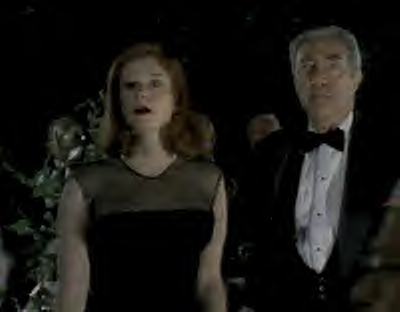
Some women love that when they’re lactating.
You get mammoth breasts.
I’ve heard it can be painful.
If you’re about to have a baby I’d love to talk to you about it. Nursing is important to speak about. It can be very painful and it can be heaven. It was a wonderful experience for me to be able to nurse my son. My whole life just revolved around him.
It was a cruddy movie, but you bonded with your son.
I don’t know if it was a cruddy movie. I wouldn’t say that. I don’t know if I’ve ever seen it. I may still have been in hormone heaven.
In Return to Blue Lagoon you play a mom.
I filmed that before I became a mom. At the time I thought, “I’m never going to become a mom after that experience!” Obviously, that was a temporary thought.
What about that movie?
Return to the Blue Lagoon was a hard, hard shoot. Probably the hardest shoot I’ve ever had to do. The people were great, but the location was a nightmare. They filmed it on a deserted island with nothing. There were no local drugstores. Everything had to be shipped in or flown in. It took days to get more Kleenex, or anything.
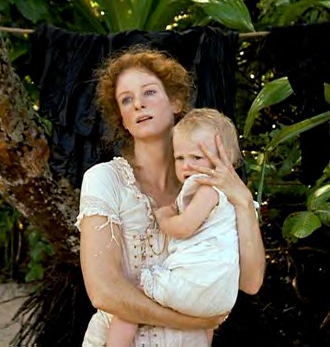
Are you more of a city woman?
Yes; however, I am also a graduate of the National Outdoor Leadership School and I also taught there in the Grand Tetons. I love the outdoors.
In Blue Lagoon all my scenes were with children. I shot for three months on this deserted island. I’m in the first half of the film. I’m first with a 1 year-old and a 2 year-old. Then they grow into 9 and 10 year-olds. Then I die, and my “children” become the teenagers.
Every single one of my scenes was either a solo scene, or one with me and the babies or me with the children. They did not have doubles or triples for the children. It was just 1 one-year-old, 1 two-year-old. And I remember them crying a lot!!!
I was the first person on the set everyday and the last person off the set. We worked long hours. I got very little sleep between shooting days and I shot every day except Sunday. We worked long hours with lots of overtime and many, many people on the set got sick or hurt on the island.
It’s the curse of the Return of the Blue Lagoon.
There were whole crews that were out. I’d do my own makeup or wardrobe. I’d do the clapperboards for the camera. At one point the whole camera crew was out. The second unit camera crew came in to film for us. There were a lot of difficult illnesses, problems, and people injuring themselves terribly, badly. I was extremely lucky. I never got sick and I never got injured.
I did all my own stunts. The stuntman at the time said, “Anytime you want a card into the stunt union I’ll give it to you because you’re amazing.” I do have a strong body. I am physical in that sense. It just required a lot of energy and endurance to keep everybody together. There were so many people sick and injured.
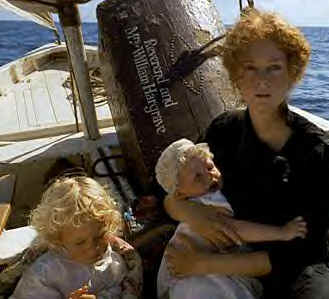
Who would think that film had such a difficult shoot?
A coconut fell from a tree and broke a guy’s shoulder. A stingray stung a crewmember who had to be flown off the island for medical treatment. The girl who played my 9-year-old daughter slipped on a rock and broke her front tooth. The cinematographer got an infection of the leg and couldn’t walk. His leg blew up 3 times the size of a normal leg. It went on and on and on.
I guess that’s part of location shooting.
It’s supposed to take place on this beautiful deserted island. The island we filmed on is Taveuni, Fiji. On one end of the island it is beautiful and sunny all the time. On the other side of the island it’s called Lavena, which means “gray clouds.” Lavena is where all the sets were built and we filmed the movie. It rained there every single day!!!
We were filming in the rain trying to make it look like it was sunshine. I didn’t have a dressing room. I had a little tent. If it started pouring I’d run into my tent. As soon as it started drizzling (and the film would not pick up on the rain) we’d run out and film! Most of the film was shot in drizzle.
The producers thought about moving location before we started filming, and I highly encouraged it once we found out that they had built all these sets in a place where it was going to rain the entire time. I said, “You’ve got to move.” They decided for financial reasons or whatever to stay where we were and continue on.
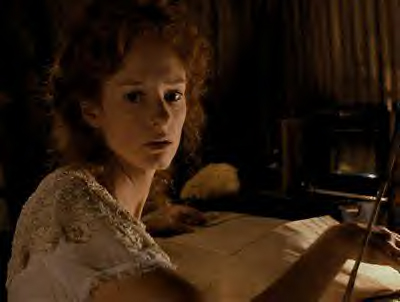
You’d think from a technical standpoint it would be tough.
They had plastic over everything. The second half of the film where they had the teenagers they actually built a studio on the Island. They built shelters to film out of the rain. They did inserts and stuff like that.
The girl Milla Jovovich is beautiful in it.
Yes, she’s a top model. She was then too.She was a great beauty and the boy was gorgeous too. Everybody was sweet. It was just the location. I have a gazillion stories. It’s unbelievable how difficult it was.Y
ou could do a whole book. You’re not old enough for your memoirs yet?
A few people have to die first for me to write my memoirs.
You have to wait before you say the horrible things about people.
Let’s not say horrible things. The Truth. I’m not good at not telling the truth.
Let’s talk about some of your TV stuff. James at 15?
I have fond memories of that show.
How was working with Lance Kerwin?
He was a sweetheart. I had my first screen kiss in that show. I played a character called Paisley Hufton. I just loved her. Lance’s character is in love with me, but Paisley wasn’t in love with him. I fell in love with somebody else. We had a whole story.
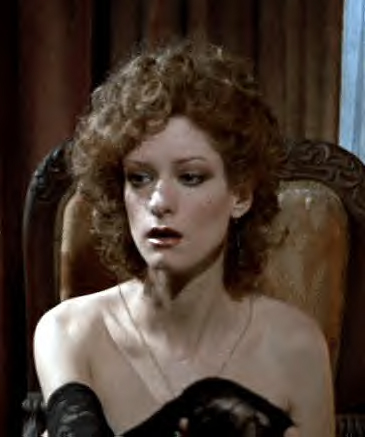
Lance said it was a revolutionary TV show at the time.
It had a wonderful writer, Dan Wakefield, and he’s a novelist too. I got to be friends with him for a while.
I remember 2 big “James” movies.
I think it was one movie of James at 15 then they started the series. The first show aired on the same night as a TV mini series I had done for PBS called The Best of Families. In James at 15 I played this very upper crust girl who lived in a mansion, had servants, oysters, I had my hair absolutely straight and everything “perfect.” In “Best of Families” I played this very poor Irish immigrant at the turn of the century that was raped. They were both on TV on the same night!
I thought, “How can I get everyone in the world to watch both shows at the same time?” That was back before VCRs.
What about “Happy Days” and “Kojak”?
On “Happy Days” I played a French girl. I could only speak French and couldn’t speak English. She was Fonzie’s date to the graduation prom. That was fun to play a character that could only speak French (and, of course could not understand what Fonzie was saying to her!). All the people were wonderful on that show. This was a two-part episode about graduation. Happy Days is taped so you rehearse it like a play and then you film it as if you’re doing it as a play. I love taped television. It was easy for me. “Kojak” was shot in New York. I was doing theater. It was a nice way to make some money.
I saw a picture of you with Linda Purl.
She’s one of my best friends. She has a son who is a year older than my son. We were in Japan together as children. Our parents knew each other when we lived in Tokyo, Japan. I think she lived most of her childhood in Tokyo. At least she lived many, many more years in Tokyo then I did. We met again in New York when we were both acting in the mini-series, Beacon Hill. And now our sons are best friends!
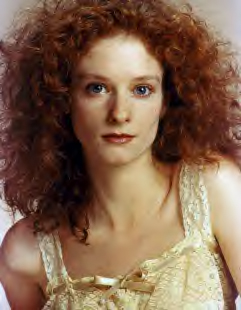
Are you more into comedy or drama?
I love comedy. I love to make people laugh! In the last couple of years I have performed in the farce, Communicating Doors by Alan Ayckbourn; and Accomplice by Rubert Holmes which is a comedy/thriller. They’re just so much fun. Then I’m doing something like The Glass Menagerie. The tragedy of going to those depths is fun in a different kind of way. I guess I could say I love whatever I’m doing now.
You have a great love of the theater.
I’m rehearsing a play I’m very excited about. I’m doing The Glass Menagerie by Tennessee Williams. I’m playing Amanda who is the mother. Usually she’s cast with an actress who would be much older than I am. So, I’m absolutely thrilled to be doing this at a young point in my career in terms of theater. Generally it would be another 20 years before I played this role. The director wanted to cast it this way & I’m just thrilled.
You must have an incredible mind for theater plays.
I love doing theaters and I love long runs of plays. Most actors like 4 or 5 weeks and then they want it over. Not me. I love being able to do it again and again. I love long runs. My favorite experience was a play called Blue Window in an extended run. I did that for about a year. It was written by Craig Lucas and directed by Norman René (who also wrote and directed Longtime Companion which is how Bruce Davison, my husband, met them. I’d done the play first so I already knew them before he met them.)
Bruce’s career is doing well too?
He’s played the senator in the X-Men movies and he has a really good film coming out called Breach. Actually, I should say, we are currently separated after 20 years of marriage.
There must be another movie that you’d like to do?
As far as I can tell my film and movie career is completely nonexistent. Maybe you’ll bring me to the forefront with your review. Every little bit helps. At this time in my career the parts I can play on the stage are glorious. The parts I’m getting offered in film are not. I can’t wait to find a wonderful, juicy role for me on film!
Is there someone you had a retroCRUSH on while growing up?
Hayley Mills. I was in love with Hayley Mills. When I was a little girl I just wanted to grow up and be Hayley Mills.
-Randy Waage
randy@retrocrush.com
Make sure to check out Lisa’s website at: www.lisapelikan.com
Lisa’s first feature film Julia comes out on DVD this February 7th.
Special thanks to:
Vince Cornelius for the use of the Jennifer photos.
Chris Chris Argyropoulos from Fox Home Entertainment for the Julia photo.
LOS ANGELES TIMES- 2004

BACKSTAGE WEST- 2004
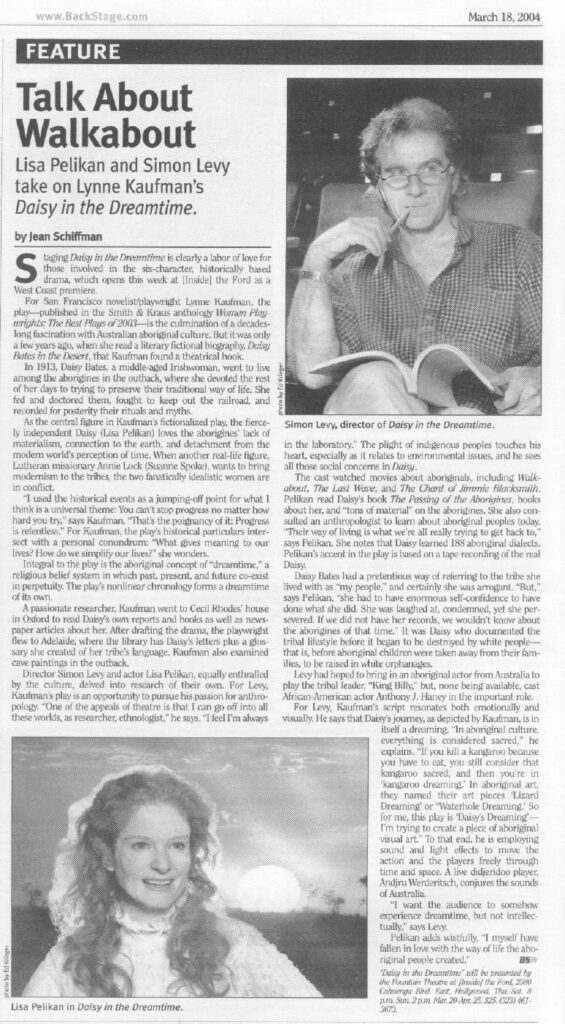
VENICE MAGAZINE – 2004
